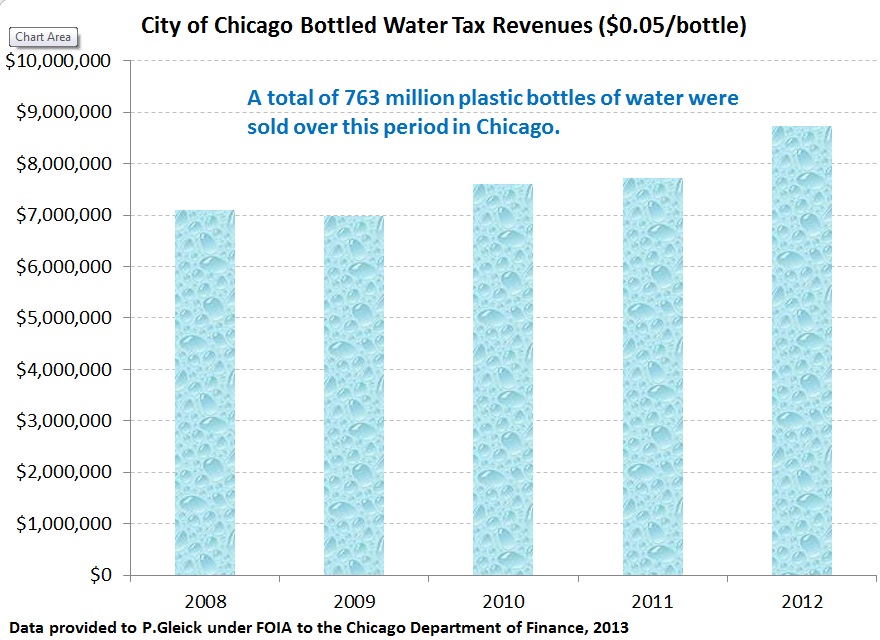Municipalities are trying to find ways of dealing with the scourge of plastic bottles in their garbage, and with falling revenues from many sources. Plastic bottles have become a significant fraction of total garbage volume, and raise collection, handling, and landfill costs when they are not recycled. In 2011, according to NAPCOR (the National Association for PET Container Resources) 5.5 billion pounds of PET plastic bottles were available for recycling, but most of those bottles were not recycled.
One answer: impose a tax on bottled water.
Fewer than 1 in 3 of all PET bottles are recycled, though most could be. [The bottled water industry claims that a higher percentage of water bottles are recycled (still under 39%), but there is no way to independently verify those data or the methods used to determine them. I asked NAPCOR for their analysis and report on plastic-water-bottle recycling, but they replied “We don't release the adjunct report to the public” since it was prepared for the bottled water industry.] Even so, accepting the optimistic estimate still means that billions and billions of plastic water bottles are sold and thrown away into garbage every year.
More and more municipalities are considering specialty taxes for problematic goods. We’ve long had special taxes on tobacco and alcohol and other dangerous, luxury, or non-essential items, and the funds raised by these taxes sometimes generate revenue used to educate consumers about healthier alternatives. In particular, such taxes can be legal and effective ways of trying to recover some of the additional damages and expenses imposed on cities by bottled water consumption, waste collection, and landfilling. The town of Concord, Massachusetts even banned single bottle sales of bottled water, though most towns don’t go this far.
Opposition to such taxes from the industries targeted can be fierce. Lobbyists, money, and political pressure pour in whenever they are proposed. As one might expect, the bottled water industry lobby group (the International Bottled Water Association), formally opposes taxes on bottled water: “IBWA opposes all taxes, surcharges, fees, and levies specifically targeted against bottled water.” [I expect to see comments on this blog post from them, below.] Part of their argument is that it would reduce the amount of bottled water sold, and thus be a smaller part of city revenues than original expected. This first effect is, of course, precisely the point of imposing selective “sin” taxes on goods and services we might want to limit, or to recover the costs of the damages imposed on society by those goods and services.
Perhaps the best example is the City of Chicago Bottled Water Tax. As of January 1, 2008 the City enacted a tax of $0.05 per bottle of water, defined as “all water which is sealed in bottles offered for sale for human consumption. The term does not include any beverage defined as a 'soft drink' under Section 3-45-020 of the Chicago Soft Drink Tax Ordinance, Chapter 3-45 of this Code." (Chicago does have other taxes that apply to some soft-drink sales.)
In the first five years of this tax (during which time the bottled water industry sued unsuccessfully in an attempt to declare the tax invalid), the City of Chicago raised over $38 million dollars on the sales of 763 million bottles of water (see Figure 1, based on data provided to me by the Chicago Department of Finance).
 Revenue from Chicago's Bottled Water Tax from 2008 to 2012. Source: Chicago Department of Finance.
Revenue from Chicago's Bottled Water Tax from 2008 to 2012. Source: Chicago Department of Finance.Prepared by Peter Gleick (2013).
This seems like a successful experiment. Other cities might consider something similar.
[Peter Gleick is author of “Bottled and Sold: The Story Behind Our Obsession with Bottled Water” published in 2010 by Island Press, Washington DC, available from Amazon or Island Press or your local bookstore.]
- Log in to post comments

Totally. Tax the crap out of bottled water.
In most european contries you pay an extra deposit for the beverage container. You get it back from the supermarkets when you return the empty bottles or cans. Most supermarkets have special machines where you just through in your bottles, then you get a coupon which is convertable to cash. So no more cans on the streets. And nearly 100% is recycled. And no, the martets didn't collapse when this system was introduced.
http://www.youtube.com/watch?feature=player_embedded&v=Q7Uxaw6YoRw
What a splendid opportunity for cap and trade-
Price the water at par with gasoline, and add a dollar for the luxury of a cap .
Just add a 5c deposit.
As per Kevin and Mark.
The German system works over there. The deposit system works (and has worked for many decades) in South Australia, but Coke and others are fighting against having it implemented in the remaining states.